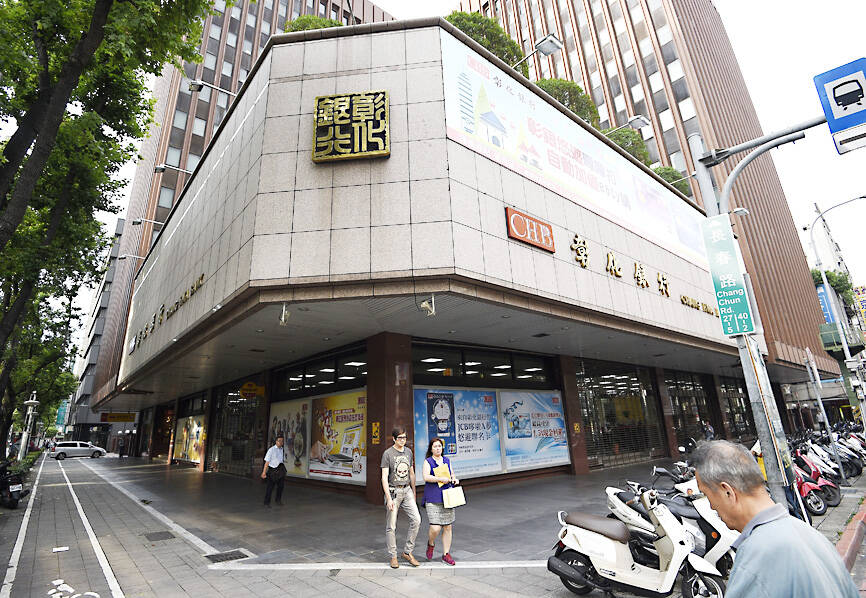Taiwanese banks have slowed their pace in opening representative offices or branches in the countries included in the government’s New Southbound Policy (NSP), data released by the Financial Supervisory Commission (FSC) showed on Friday.
So far this year, only two local banks applied for and received approval to open outlets in New Southbound countries, the commission said.
In June, the FSC approved Chang Hwa Commercial Bank’s (彰化銀行) application to open a branch in Sydney, and in September it allowed E.Sun Commercial Bank (玉山銀行) to set up a representative office in Kuala Lumpur.

Photo: Chen Chih-chu, Taipei Times
While the commission in April approved Taipei Fubon Commercial Bank’s (台北富邦銀行) application to upgrade its representative office in Sydney to a branch, it was not considered a new outlet, the regulator said.
The New Southbound Policy aims to enhance trade and exchanges between Taiwan and 18 countries in Southeast and South Asia, as well as Australia and New Zealand, to reduce Taiwan’s dependence on China.
The policy was introduced after President Tsai Ing-wen (蔡英文) took office in 2016.
In response to the initiative, the commission in 2017 set a goal to encourage Taiwanese banks to open no fewer than three new representative offices or branches in the New Southbound countries each year.
In 2017, the commission approved applications from Taiwanese banks to set up 17 outlets in the 18 countries, and eight each year during the 2018-2020 period before falling to five in 2021 and one last year, FSC data showed.
From 2017 to last month, the commission approved the opening of 49 representative offices and branches in the 18 countries, it showed.
Regarding the drop in interest from local banks in setting up outlets in the countries, Banking Bureau Deputy Director-General Roger Lin (林志吉) said if no more banks apply to open branches by the end of this year to meet the commission’s target, it would consider changing the goal of opening three new outlets per year.
Asked whether the banking markets in the 18 countries have been so saturated that local banks had to scale back their expansion efforts, Lin said it was up to banks to judge the market conditions.
He said that how local financial institutions map out their expansion plans in foreign markets depends on economic activities, and bilateral trade and investments between the markets and Taiwan.

Taiwan Semiconductor Manufacturing Co (TSMC, 台積電) would not produce its most advanced technologies in the US next year, Minister of Economic Affairs J.W. Kuo (郭智輝) said yesterday. Kuo made the comment during an appearance at the legislature, hours after the chipmaker announced that it would invest an additional US$100 billion to expand its manufacturing operations in the US. Asked by Taiwan People’s Party Legislator-at-large Chang Chi-kai (張啟楷) if TSMC would allow its most advanced technologies, the yet-to-be-released 2-nanometer and 1.6-nanometer processes, to go to the US in the near term, Kuo denied it. TSMC recently opened its first US factory, which produces 4-nanometer

PROTECTION: The investigation, which takes aim at exporters such as Canada, Germany and Brazil, came days after Trump unveiled tariff hikes on steel and aluminum products US President Donald Trump on Saturday ordered a probe into potential tariffs on lumber imports — a move threatening to stoke trade tensions — while also pushing for a domestic supply boost. Trump signed an executive order instructing US Secretary of Commerce Howard Lutnick to begin an investigation “to determine the effects on the national security of imports of timber, lumber and their derivative products.” The study might result in new tariffs being imposed, which would pile on top of existing levies. The investigation takes aim at exporters like Canada, Germany and Brazil, with White House officials earlier accusing these economies of

GREAT SUCCESS: Republican Senator Todd Young expressed surprise at Trump’s comments and said he expects the administration to keep the program running US lawmakers who helped secure billions of dollars in subsidies for domestic semiconductor manufacturing rejected US President Donald Trump’s call to revoke the 2022 CHIPS and Science Act, signaling that any repeal effort in the US Congress would fall short. US Senate Minority Leader Chuck Schumer, who negotiated the law, on Wednesday said that Trump’s demand would fail, while a top Republican proponent, US Senator Todd Young, expressed surprise at the president’s comments and said he expects the administration to keep the program running. The CHIPS Act is “essential for America leading the world in tech, leading the world in AI [artificial

REACTIONS: While most analysts were positive about TSMC’s investment, one said the US expansion could disrupt the company’s supply-demand balance Taiwan Semiconductor Manufacturing Co’s (TSMC, 台積電) new US$100 billion investment in the US would exert a positive effect on the chipmaker’s revenue in the medium term on the back of booming artificial intelligence (AI) chip demand from US chip designers, an International Data Corp (IDC) analyst said yesterday. “This is good for TSMC in terms of business expansion, as its major clients for advanced chips are US chip designers,” IDC senior semiconductor research manager Galen Zeng (曾冠瑋) said by telephone yesterday. “Besides, those US companies all consider supply chain resilience a business imperative,” Zeng said. That meant local supply would